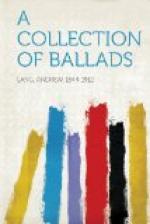From Percy’s Folio Manuscript. There is a cognate Greek epigram—
[Greek text which cannot be reproduced]
GORDON OF BRACKLEY
This, though probably not the most authentic, is decidedly the most pleasing version; it is from Mackay’s collection, perhaps from his pen.
EDWARD
Percy got this piece from Lord Hailes, with pseudo-antiquated spelling. Mr. Swinburne has published a parallel ballad “From the Finnish.” There are a number of parallel ballads on Cruel Brothers, and Cruel Sisters, such as Son Davie, which may be compared. Fratricides and unconscious incests were motives dear to popular poetry.
YOUNG BENJIE
From the Border Minstrelsy. That corpses might begin to “thraw,” if carelessly watched, was a prevalent superstition. Scott gives an example: the following may be added, as less well known. The watchers had left the corpse alone, and were dining in the adjoining room, when a terrible noise was heard in the chamber of death. None dared enter; the minister was sent for, and passed into the room. He emerged, asked for a pair of tongs, and returned, bearing in the tongs A bloody glove, and the noise ceased. He always declined to say what he had witnessed. Ministers were exorcists in the last century, and the father of James Thomson, the poet, died suddenly in an interview with a guest, in a haunted house. The house was pulled down, as being uninhabitable.
AULD MAITLAND
From The Border Minstrelsy. This ballad is inserted, not for its merit, still less for its authenticity, but for the problem of its puzzling history. Scott certainly got it from the mother of the Ettrick Shepherd, in 1801. The Shepherd’s father had been a grown-up man in 1745, and his mother was also of a great age, and unlikely to be able to learn a new-forged ballad by heart. The Shepherd himself (then a most unsophisticated person) said, in a letter of June 30, 1801, that he was “surprized to hear this song is suspected by some to be a modern forgery; the contrary will be best proved by most of the old people, here about, having a great part of it by heart.” The two last lines of verse seven were, confessedly, added by Hogg, to fill a lacuna. They are especially modern in style. Now thus to fill up sham lacunae in sham ballads of his own, with lines manifestly modern, was a favourite trick of Surtees of Mainsforth. He used the device in “Barthram’s Dirge,” which entirely took in Sir Walter, and was guilty of many other supercheries, especially of the “Fray of Suport Mill.” Could the unlettered Shepherd, fond of hoaxes as he was, have invented this stratagem, sixteen years before he joined the Blackwood set? And is it conceivable that his old mother,




